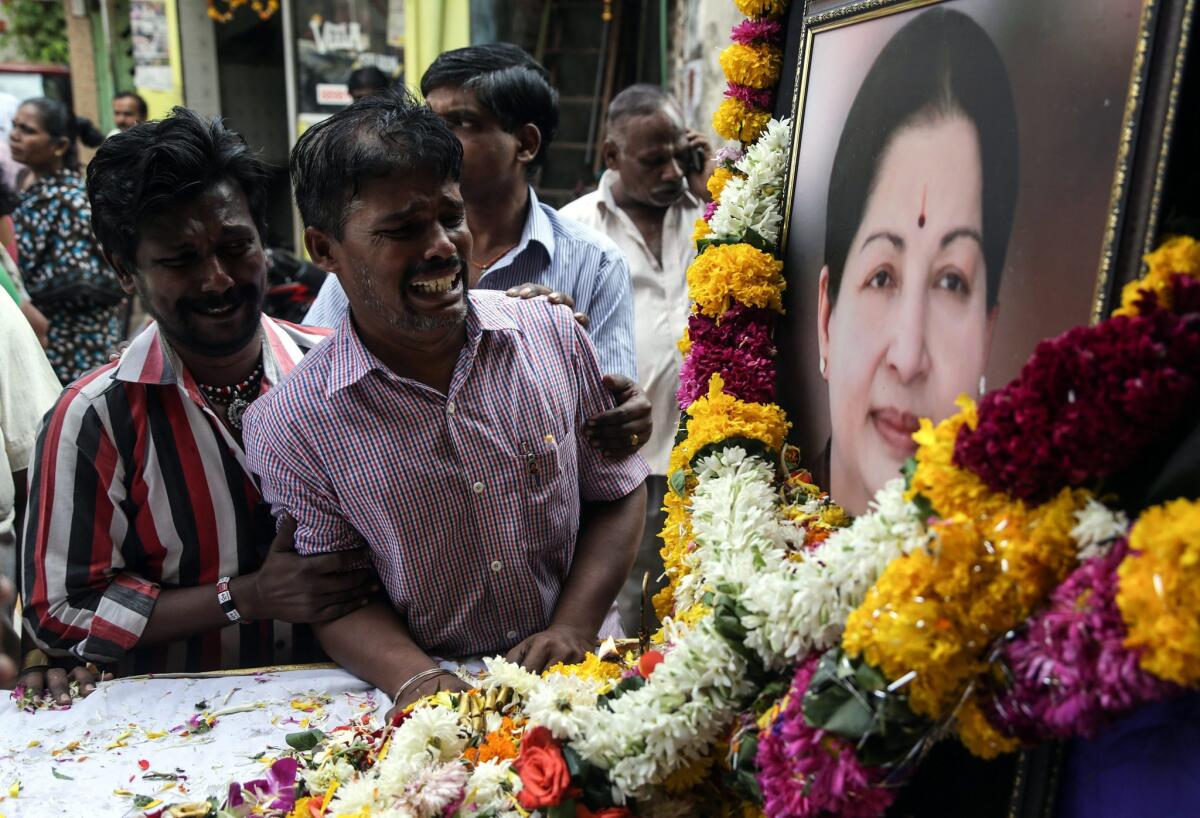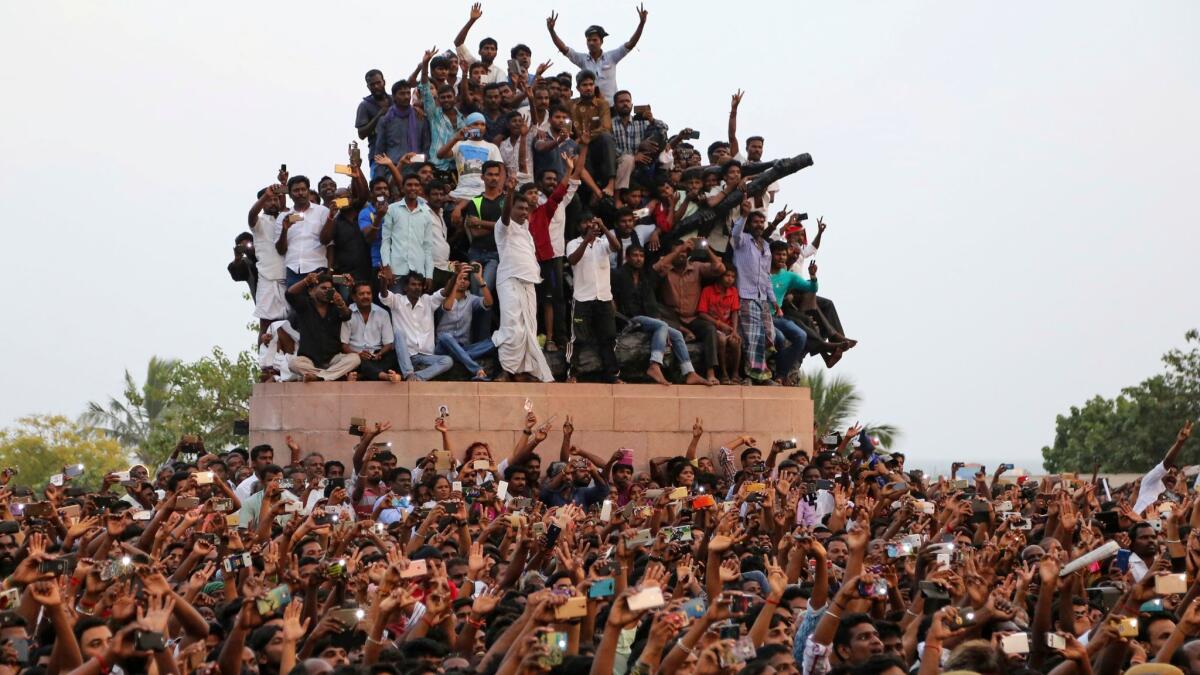India mourns death of politician who inspired such devotion that her fans set themselves on fire

Reporting from Mumbai, India — India declared a national day of mourning, and thousands poured into the streets to grieve Tuesday following the death of Jayaram Jayalalithaa, a former teenage actress who climbed the male-dominated ranks of both film and politics to win five terms as leader of the southern state of Tamil Nadu.
Jayalalithaa died at a hospital Monday night in the southern city of Chennai after undergoing surgery for a heart attack.
For the record:
3:19 p.m. Nov. 28, 2024An earlier version of this article said Jayaram Jayalalithaa’s former film costar and political mentor, M.G. Ramachandran, was 35 years her senior. He was 31 years her senior.
The 68-year-old authoritarian leader was a goddess-like figure in Tamil Nadu, revered as “Amma,” or Mother, inspiring such fierce devotion during her up-and-down career that followers sometimes attempted suicide or set themselves on fire when she was in trouble.
One party worker set himself ablaze Monday night in the western part of the state and was hospitalized for severe burns, police said. Her aide, O. Panneerselvam, was sworn in as her replacement early Tuesday while carrying a photograph of her in his pocket.
As her Indian flag-draped casket was paraded through Chennai, formerly known as Madras, women wailed and beat their chests, and men in military uniform saluted. She was buried with state honors on the city’s Marina Beach, an eight-mile stretch of sand along the Bay of Bengal, next to her former film co-star and political mentor, M.G. Ramachandran.

India has no shortage of cult heroes in politics, movies, cricket and religion, but few won as much admiration — or contempt — as Jayalalithaa. She was populist, corrupt and secretive until the end, her aides sharing scant details of her health even as she lay hospitalized since September.
Serving 14 years as chief minister — the highest elected position in the state — she turned Tamil Nadu, with its 72 million people, into a munificent welfare state. She established “Amma” pharmacies and “Amma” cafeterias where the poor could buy cheap medicine and food. Products like salt, cement and even drinking water were packaged with her picture and sold at subsidized prices.
Her party, the All India Anna Dravida Munnetra Kazhagam, or AIADMK, took the timeworn Indian practice of election-time giveaways to a new level — doling out kitchen appliances, laptops, color TVs and livestock to woo voters.
The success she enjoyed, endearing herself to the lowest classes, defies easy explanation.
— A.R. Venkatachalapathy, a historian, on Jayaram Jayalalithaa
The spending plunged the state into debt but won her unstinting loyalty from millions of fans, particularly as corruption charges shadowed her career. After a 2014 conviction landed her in jail for three weeks, more than 30 people committed suicide over the news, according to unconfirmed reports from party workers.
Yet the lavish personal wealth she amassed while in office made her an object lesson in the excesses of money in Indian politics.
Police once raided her house to find 64 pounds of diamond-studded gold jewelry, thousands of saris, 750 pairs of shoes, 91 designer watches and 19 cars. She never married or bore children, but in 1995, she invited more than 150,000 guests to a wedding for her foster son at a 50-acre lawn, making the Guinness Book of World Records for the largest wedding reception.
When asked about the outlandish cost, Jayalalithaa said, with characteristic imperiousness, that it was paid for by “the people.”
“The success she enjoyed, endearing herself to the lowest classes, defies easy explanation,” said A.R. Venkatachalapathy, a historian and professor at the Madras Institute of Development Studies.
She had the advantage of taking power in a state with high levels of education and a relatively efficient bureaucracy. Tamil Nadu boasts low rates of infant mortality and crime and the highest rate of factory employment in India, according to an analysis by India Spend, a data-driven news site.
Born into an upper-caste Hindu family in 1948, she was 16 when she appeared in her first Tamil-language film alongside matinee idol Ramachandran, 31 years her senior. He soon insisted on casting her opposite him in every movie. In the 1980s she followed him into politics and joined the AIADMK, the party he formed.
Party grandees did not take her seriously, but she asserted herself with a flair worthy of Indian melodramas. Barred from Ramachandran’s funeral in 1987, she barged through and climbed atop the carriage transporting his casket — a move that seemed calculated to establish her as his heir — before being roughly pulled down by his nephew.
In 1989, during a shouting match in the state assembly chamber, a politician from a rival party attacked her by grabbing the long fabric of her sari. She left the chamber distraught and later compared herself to Draupadi, a character from the Hindu epic Mahabharata, who was forcibly disrobed after one of her husbands lost her in a bet.
She said she wouldn’t return to the chamber “until conditions are created under which a woman may attend the assembly safely” — cementing her as a feminist icon.
Jayalalithaa never groomed an heir to the party she built into India’s most successful regional political organization, leaving its future in doubt. She scorned her rivals and allies alike, demanding elaborate shows of fealty from male aides who often bowed at her feet.
One story says that a former official who had left the party in a dispute with Jayalalithaa returned to pay his respects and prostrated himself before her — but because a photographer in the room didn’t capture the moment, he was ordered to lie down again.
Venkatachalapathy said Jayalalithaa developed a distrust of men during her career in the notoriously sexist Indian film industry, which “may account for the way she humiliated men the way she did when she was in power.”
And she was quick to cite bias when the media reported on her unfavorably, which was often. Journalists found themselves the targets of lawsuits just for reporting on her opponents.
In a 2004 TV interview, Jayalalithaa grew angry with a string of questions about corruption charges, her leadership style and reports that she had added an extra “a” at the end of her name on the advice of a numerologist.
“You are a very tough person, chief minister,” the interviewer, Karan Thapar, said when she refused to answer a question.
“People like you have made me so,” she said.
Parth M.N. is a special correspondent.
Follow @SBengali on Twitter for more news from South Asia
ALSO
Cash chaos in India: An unprecedented ban on large bills backfires on the poor
China hopes new film studio and theme park will boost ties to international movie industry
More to Read
Sign up for Essential California
The most important California stories and recommendations in your inbox every morning.
You may occasionally receive promotional content from the Los Angeles Times.











